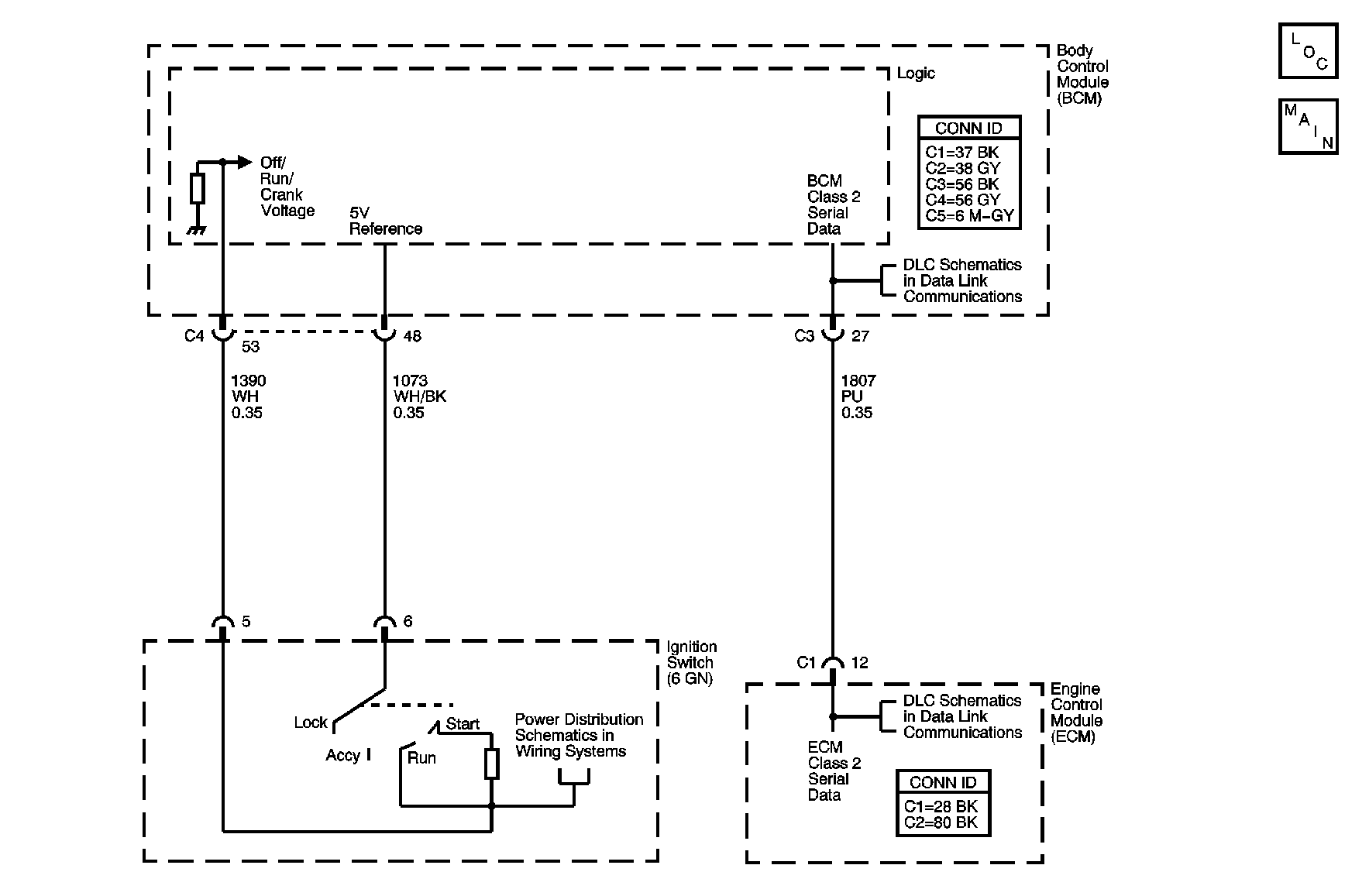
Circuit Description
The Passlock system is provided in order to prevent vehicle theft if the ignition lock cylinder is forced to rotate. The Passlock controller reads the coded Passlock data signal. The data consists of a voltage generated by a voltage divider network created between the Passlock assembly and the Passlock controller. If the data is correct , indicating rotation of the lock cylinder with the proper mechanically cut key, then the Passlock controller sends a password to the Powertrain controller via serial data to indicate that engine starting should be allowed. The Passlock controller also interfaces with the driver displays subsystem to indicate, via the security indicator, the Passlock subsystem's status and acute subsystem failures.
DTC Descriptor
This diagnostic procedure supports the following DTC:
DTC B2928 Security System Sensor Data Circuit High
Conditions for Setting the DTC
| • | The ignition switch is ON. |
| • | The body control module (BCM) signal input is greater than 4.9 volts for 1 second after turning the ignition switch to the CRANK position. |
Action Taken When the DTC Sets
| • | The DTC will set only when the engine is running. |
| • | The BCM will be in the fail enable mode allowing the vehicle to start and run. |
| • | The security indicator will be ON. |
Conditions for Clearing the DTC
| • | The current DTC will clear once an ignition cycle has occurred without the fault recurring. |
| • | After 100 concurrent ignition cycles occur without the fault recurring, a history DTC clears. |
| • | Using a scan tool. |
Diagnostic Aids
| • | Use a scan tool in order to inspect the Passlock data voltage and the Passlock code. |
| • | Inspect the Passlock sensor harness for an intermittent or a short to battery. Refer to Testing for Intermittent Conditions and Poor Connections in Wiring Systems. |
| • | You may be directed to this table from the VTD Diagnostic System Check without a DTC B2958 being set. If you were directed to this table, follow all of the steps in this diagnostic table. |
| • | When directed to this table, DTC B2958 may have a history status. |
Test Description
The numbers below refer to the step numbers on the diagnostic table.
-
This step tests for a short to voltage on the 5V reference circuit from the BCM.
-
This step tests for a short to voltage on the off/run/crank voltage circuit.
Step | Action | Value(s) | Yes | No |
|---|---|---|---|---|
Schematic Reference: | ||||
1 | Did you perform the Diagnostic System Check-Vehicle? | -- | Go to Step 2 | Go to Diagnostic System Check - Vehicle in Vehicle DTC Information |
Is the 5V reference circuit voltage greater than the specified value? | 5 V | Go to Step 4 | Go to Step 3 | |
Important: Do not start the vehicle. Is the voltage measured at the off/run/crank voltage circuit near the specified value? | 5 V | Go to Step 5 | Go to Step 6 | |
4 | Inspect the 5V reference circuit for a short to voltage. Refer to Circuit Testing and Wiring Repairs in Wiring Systems. Did you find and correct the condition? | -- | Go to Step 11 | Go to Step 6 |
5 | Inspect the off/run/crank voltage circuit for a short to voltage. Refer to Circuit Testing and Wiring Repairs in Wiring Systems. Did you find and correct the condition? | -- | Go to Step 11 | Go to Step 7 |
6 | Inspect for poor connections at the BCM. Refer to Testing for Intermittent Conditions and Poor Connections and Connector Repairs in Wiring Systems. Did you find and correct the condition? | -- | Go to Step 11 | Go to Step 8 |
7 | Inspect for poor connections at the ignition switch. Refer to Testing for Intermittent Conditions and Poor Connections and Connector Repairs in Wiring Systems. Did you find and correct the condition? | -- | Go to Step 11 | Go to Step 9 |
8 | Replace the BCM. Refer to Control Module References in Computer/Integrating Systems for replacement, setup, and programming. Did you complete the replacement? | -- | Go to Step 11 | -- |
9 | Replace the ignition switch. Refer to Ignition and Start Switch Replacement in Steering Wheel and Column. Did you complete the replacement? | -- | Go to Step 11 | -- |
10 | Perform the Programming Theft Deterrent System Components procedure. Is the repair complete? | -- | Go to Step 11 | -- |
11 |
Does the DTC reset? | -- | Go to Step 2 | System OK |
